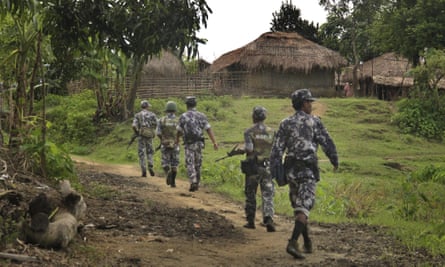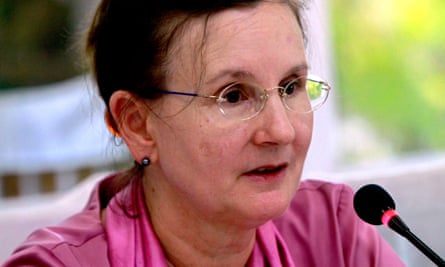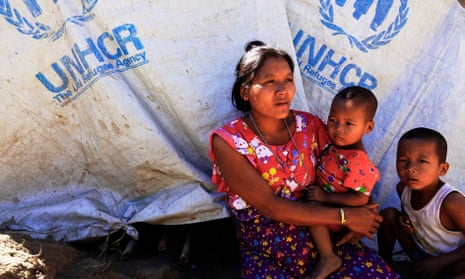A damning report by the UN on its own conduct in Myanmar has condemned the organisation’s “obviously dysfunctional performance” over the past decade and concluded there was a systemic failure.
The report, seen by the Guardian before publication, was commissioned by the secretary general, António Guterres, after accusations that the UN system ignored warning signs of escalating violence before an alleged genocide of Myanmar’s Rohingya minority.
The report, written by a Guatemalan former foreign minister, Gert Rosenthal, concludes there were various damaging failures, including competing strategies between agencies, a “culture of mistrust” in relations with Myanmar’s government and “mixed and incomplete signals coming from the field”. The report is due to be made public this week.
“Without question, serious errors were committed and opportunities were lost in the UN system following a fragmented strategy rather than a common plan of action,” Rosenthal writes. “The overall responsibility was of a collective nature; in other words it can truly be characterised as a systemic failure of the United Nations.”
Myanmar’s military launched a crackdown on the Rohingya in Rakhine state in August 2017. The violence, which the UN described as ethnic cleansing and possible genocide, included the killing of thousands of people, the rape of women and children and the razing of villages. More than 700,000 Rohingya fled across the border to Bangladesh.

Rosenthal’s report emphasises the damaging impact of competing strategies between some UN agencies and individuals. The polarisation of approaches between quiet diplomacy with the Myanmar government and public condemnation of escalating human rights abuses became more magnified as the situation in Rahkine worsened, the report says.
“Even at the highest level of the organisation there was no common strategy,” Rosenthal writes. As a result, the UN system was “relatively impotent to effectively work with the authorities of Myanmar to reverse the negative trends in the area of human rights”.
The situation descended into “unseemly fighting” where “those that promote constructive engagement sometimes incur the wrath of those who favour a more robust advocacy role and vice versa,” the report says. “One can only speculate that [former] secretary general Ban Ki-Moon was either unwilling or unable to arbitrate a common stance between these two competing perspectives.”
Rosenthal emphasises that he did not investigate particular individuals, but his report addresses the controversial actions of the former resident coordinator for Myanmar, Renata Lok-Dessallien, who was accused of downplaying concerns about worsening abuses against the Rohingya to further her development agenda.
Rosenthal’s findings confirm what many had claimed, that “there appear to have been instances of deliberately de-dramatising events in reports prepared by the resident coordinator”.

His report says Lok-Dessallien was brought in to push forward a development agenda, and she “suddenly found herself embroiled in a situation with strong political overtones,” which was not her area of expertise. Despite pleas for assistance, Lok-Dessallien was “understaffed and without clear instructions from headquarters”.
Rosenthal writes that Myanmar’s government “appeared to exploit the diverse narratives that they were hearing from different UN entities to play one against another” and forward its own agenda.
This was reiterated by a UN source in Myanmar who described the relationship with the UN and the government as unchanged. “It seems to be that the Myanmar government and military have a set policy with senior UN people where they try to affect who is hired, work with them for as long as they play ball and then cut ties and ask for their removal when they do something they don’t like, as we have seen with Knut Ostby,” he said. “The UN of course mostly gives into their demands and then the whole cycle starts again.”
Ostby, the current resident coordinator, is stepping down after his contract was not renewed, reportedly as a result of pressure from the government over the situation in Rakhine.
Speaking at a UN briefing, UN spokesperson Stephane Dujarric said the report had been shared with senior UN leaders and the Secretary General.
“The Secretary-General has accepted the report’s recommendations and is committed to implementing them so as to improve the performance of the United Nations system,” said Dujarric. “This review is valuable for the Resident Coordinator and the UN Country Team in Myanmar, as well as in other countries where the UN operates in similarly challenging conditions.”
The UN had been reluctant to make the internal report public, according to Matthew Smith, the chief executive of the NGO Fortify Rights, which was among those to have highlighted UN dysfunction in Myanmar for years.
Smith welcomed the fact that the report had been written but was critical of its content. “The report repeatedly states that it’s difficult to assign responsibility to individuals, which is ironically representative of the problem,” he said. “Failures in the UN rarely lead to accountability. Who else could be responsible for a systematic failure than the individuals involved?
“This report will be helpful if it can push the UN in a better direction, but it appears to have dodged the most difficult task of unearthing what specifically went wrong in Myanmar. There are no easy answers but some level of accountability is needed.”
The former assistant UN secretary general Charles Petrie, who in 2012 authored a report on similar UN failures in Sri Lanka during the endgame of the civil war, said he thought Rosenthal had “done a very good job” but that “ultimately he doesn’t say anything new”.
“It’s really a question of the system not having the determination and courage to implement the lessons that are so blatantly clear,” he said .










